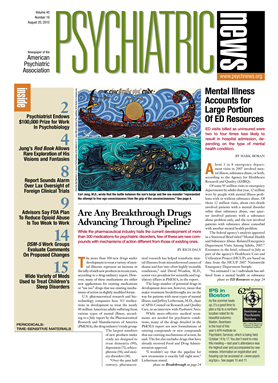Many of you have been reading the numerous articles in Psychiatric News and other APA communications on the progress we are making on the development of DSM-5, which has a target publication date of May 2013. This column will bring you up to date on our progress and the plans for the coming year.
Over the past year, APA has focused on broadening the audiences that are informed of the revision process. This effort has included DSM-5 panel presentations at our annual meeting and other specialty mental health organization conferences, presentations by DSM-5 work group members at academic and other professional gatherings, numerous media commentaries and editorials from the revision experts, updates on popular social media outlets like Facebook and Twitter, and postings of past and upcoming DSM-5 publications and presentations.
In what has been a most noteworthy effort to expand inclusion in the revision process, APA launched a Web site for DSM-5 a few years ago to post information on the manual as work progressed. This past February, the proposed criteria were posted on the site and comments invited for a two-month period. In that time, there were approximately 50 million hits. More than 8,600 comments were submitted from psychiatrists and other physicians, including members of academic and specialty medical groups; mental health care professionals; representatives from mental health advocacy organizations; and, importantly, from patients and their loved ones. Comments were also submitted by paper mail and e-mail.
Members of the 13
DSM-5 work groups have reviewed every comment (see
DSM-5 Work Groups Assess Thousands of Comments) and in April began revising some criteria sets. Correspondence from patients and advocacy groups was very informative. Prior to the launch of the Web site, APA conducted a telebriefing with 20 consumer and family advocacy organizations, including the National Alliance on Mental Illness and Mental Health America. These groups were asked to carefully review the proposed criteria so we can ensure that changes to
DSM are considered in light of their “real-world” impact but without compromising scientific integrity. Many of these comments noted that patient issues, such as stigma, treatment accessibility, and insurance reimbursement, are important considerations in the revision process. For example, the Neurodevelopmental Disorders Work Group put forth a proposal for combining the disorders of autism, Asperger's disorder, and pervasive developmental disorder not otherwise specified into a single category called “autism spectrum disorders.” This proposal garnered more than one-third of the nearly 2,000 Web site comments submitted to the Neurodevelopmental Disorders Work Group—with many arguing against the change. While the work group members conducted a thorough review of existing data and research literature in reaching their recommendation, the comments underscored an additional piece of evidence—that of patient self-identity. Many criticisms indicated that some individuals diagnosed with Asperger's disorder (self-designated as “Aspies”) have developed a strong sense of uniqueness and belonging built around the diagnosis, an identity that is often supported by their families. Categorizing them in these other diagnoses, they argued, would deprive them of their identity and associate them with diagnoses that are more stigmatizing.
With the first feedback phase now completed, the draft proposals are now undergoing field trials to assess the diagnostic criteria. This phase involves a thorough examination of whether criteria can be consistently applied by different clinicians and in different settings, as well as whether clinicians find the revisions understandable, helpful for diagnosis and treatment planning, and easy to use.
Also, the field trials will examine potential revisions that might affect the manual as a whole, such as the use of dimensional assessments to better detect co-occurring symptoms that may require treatment, as well as diagnostic severity measures to characterize clinical presentations more effectively. Field-trial participants will include health care professionals from a variety of backgrounds—psychiatrists, psychologists, social workers, psychiatric clinical nurse practitioners, primary care providers, and others. Both large academic-research institutions and smaller clinical practices will be used.
These field trials will be conducted through early 2011, and the data they yield will form the basis for another round of revisions to the criteria. Then next summer, the profession and the public will again have an opportunity to submit comments online.
The development of
DSM is an extraordinarily exciting process. I look forward to providing future updates and sharing the privilege of shaping our work on this project together.


